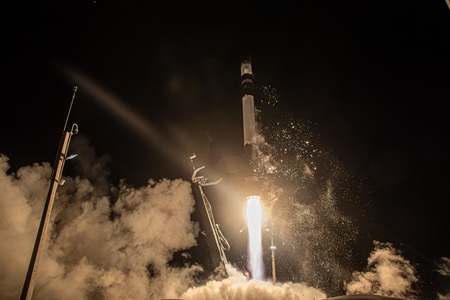Rocket Labs Electron rocket deployed the ADRAS-J satellite for Astroscale Japan to conduct an orbital debris inspection demonstration mission.
 Rocket Lab launched its 44th Electron rocket, carrying out the mission named On Closer Inspection. The launch took place from Pad B at Rocket Labs Launch Complex 1 in New Zealand at 03:52 NZDT on February 19, 2024 (14:52 UTC, February 18). The Electron rocket deployed the Active Debris Removal by Astroscale-Japan (ADRAS-J) satellite, designed specifically to test technologies and operations for approaching and monitoring debris objects in orbit, commonly known as space junk. This mission represents the initial step in evaluating the potential for satellites to rendezvous with orbital debris objects, aiding in their deorbiting process and supporting space sustainability for future generations.
Rocket Lab launched its 44th Electron rocket, carrying out the mission named On Closer Inspection. The launch took place from Pad B at Rocket Labs Launch Complex 1 in New Zealand at 03:52 NZDT on February 19, 2024 (14:52 UTC, February 18). The Electron rocket deployed the Active Debris Removal by Astroscale-Japan (ADRAS-J) satellite, designed specifically to test technologies and operations for approaching and monitoring debris objects in orbit, commonly known as space junk. This mission represents the initial step in evaluating the potential for satellites to rendezvous with orbital debris objects, aiding in their deorbiting process and supporting space sustainability for future generations.
The 150kg ADRAS-J satellite, following a successful launch aboard Electron, will now embark on its mission to closely approach an aged, derelict rocket stage orbiting in space. This particular rocket stage is the Japanese H-2A upper stage left behind in low Earth orbit subsequent to the launch of the GOSAT Earth observation satellite back in 2009. ADRAS-J will conduct observations of this 11m long and 4m diameter stage, employing cameras and sensors to understand its behaviour and explore potential methods for assisted deorbiting in the future. Astroscale estimates that the full mission will span between three to six months to complete.
Rocket Lab founder and CEO, Peter Beck, expressed his congratulations to the Astroscale team on this groundbreaking mission, emphasising the significance of innovative approaches to reduce orbital debris and maintain safe accessibility to space. He further stated: Its a real honour to provide a dedicated launch service and enable the kind of precise orbital manoeuvres required for an advanced mission like this.
To facilitate the rendezvous of the ADRAS-J satellite with the derelict H-2A upper stage in orbit, Rocket Lab undertook meticulous planning, requiring strict launch timing and precision orbital deployment parameters. The final perigee, apogee, and inclination parameters were provided by Astroscale a mere 20 days before launch, a departure from the typical practice of determining these parameters many months ahead of a launch. Rocket Lab’s mission necessitated highly accurate orbital insertion with tighter margins compared to standard missions. The exact T-0 was determined only the day prior to launch, with required LTAN accuracy allowing for only +/- 15 seconds, underscoring Rocket Labs capability to deliver rapid and responsive advanced guidance, navigation, and control analysis.
Astroscale founder & CEO Nobu Okada added: Todays successful launch of ADRAS-J marks another milestone toward our efforts to grow the on-orbit servicing sector while creating a sustainable space environment. We are grateful for the collaboration with Rocket Lab, whose expertise in dedicated launch services has been instrumental to the start of this groundbreaking mission.








































































